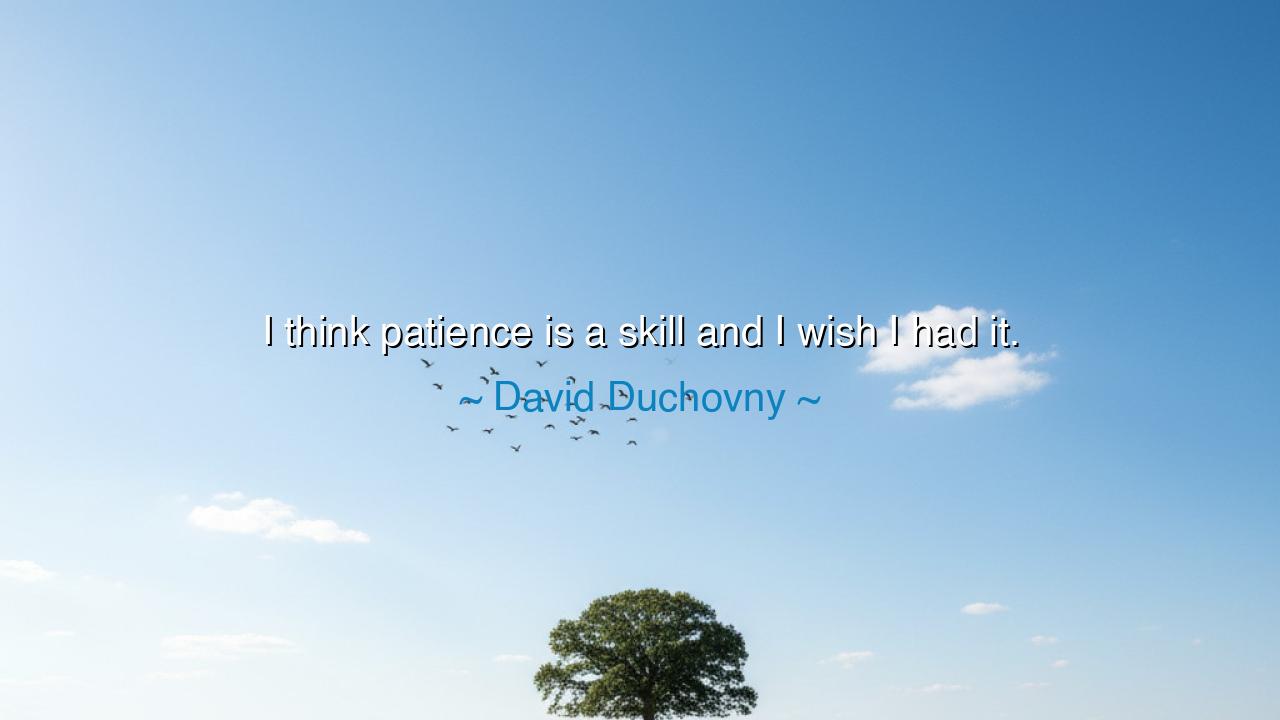
I think patience is a skill and I wish I had it.






David Duchovny, a man of words and images, once confessed with rare humility: “I think patience is a skill and I wish I had it.” In this brief yet profound statement lies the admission of a universal struggle—the recognition that patience is not merely a temperament, but a discipline, something to be cultivated like a craft. His longing for it reveals that patience is not an inherited gift bestowed upon the few, but a learned strength that can be acquired by those who are willing to practice its art.
The meaning of his words is clear: patience is a skill, not unlike music, painting, or writing. It requires training, failure, and persistence. To wait without anger, to endure without complaint, to hold steady when every fiber of one’s being longs to leap ahead—these are not instincts, but achievements of the spirit. To say, as Duchovny does, “I wish I had it,” is to remind us all that patience must be deliberately sought, for without it, even the most talented can falter in the storms of life.
History itself gives testimony to this truth. Consider the long march of Nelson Mandela, who endured twenty-seven years in prison. His struggle was not simply the endurance of chains, but the mastery of patience. He emerged not with bitterness, but with vision, guiding his people toward reconciliation rather than vengeance. His triumph was not of the body, but of the spirit trained in the school of patience. Had he lacked that skill, his story might have ended in despair rather than greatness.
And yet, Duchovny’s words also carry an undertone of yearning familiar to us all. For who among us has not wished to be more patient? Who has not burned with restlessness when the future seemed too slow in arriving? Even the wisest admit to this struggle. The Stoic philosopher Seneca spoke of time as the most precious resource, wasted by impatience and ingratitude. He taught that to master patience is to master life itself, for all things unfold in their appointed season.
Patience, however, is not the absence of action. It is the discipline of right action at the right time. The farmer does not sit idle; he tills, he waters, he watches—but he does not dig up the seed each day to see if it grows. The soldier does not rush blindly into battle; he waits for the signal, the strategy, the moment when victory can be seized. Patience is thus the companion of wisdom, not passivity, and to lack it is to act without harmony, like striking a note before its time.
The lesson, then, is to treat patience as Duchovny describes it: as a skill. If it is a skill, it can be learned. Begin with small acts—waiting in silence rather than complaining, breathing deeply when anger stirs, resisting the urge to rush what must unfold slowly. With each attempt, the spirit strengthens, just as muscles strengthen under strain. To envy patience in others, as Duchovny does, is natural; but greater still is to train oneself so that envy becomes imitation, and imitation becomes mastery.
Therefore, O seeker of wisdom, take these words to heart. Do not despair if you lack patience, for even those we admire confess the same. Instead, let Duchovny’s admission guide you toward practice. See patience as a skill to be forged, not a gift to be envied. And remember always: those who master patience master themselves, and those who master themselves can endure anything. In the end, patience is not only a skill—it is the key to strength, peace, and the unfolding of destiny.






AAdministratorAdministrator
Welcome, honored guests. Please leave a comment, we will respond soon